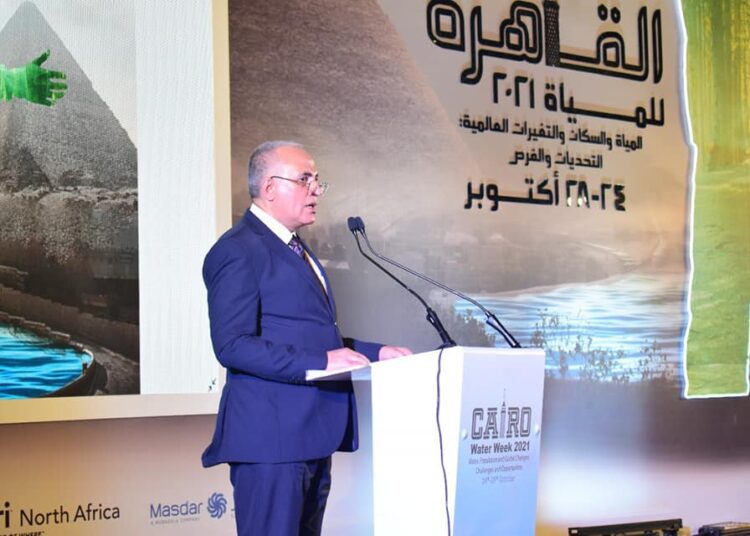Egypt’s Prime Minister, Moustafa Madbouli, described on Sunday the River Nile as an ‘existential issue’ for Egypt and Egyptians.
“It is at the heart of the life and the survival of the Egyptian people,” he said.
Addressing the opening session of the 4th edition of the Cairo Water Week (CWW), the Egyptian premier noted that this extreme importance of the river for Egypt makes it necessary for its people to engage in dialogue on sustainable development in connection with water.
The 4th edition of the CWW started in the Egyptian capital yesterday under the slogan, ‘Water, Population and Global Changes: Challenges and Opportunities”, and under the patronage of President Abdel Fattah El Sisi.
A large number of ministers, official delegates, scientists, and representatives of international organisations and institutes attended the first day of the event, along with representatives of the civil society and legal professionals from different countries.
The 1,000 dignitaries attending physically were accompanied by 800 others who participated in the conference virtually.
Those attending in person included 20 ministerial delegations. Forty-four other ministerial delegations attended virtually.
Prime Minister Madbouli said Egypt’s geographical nature made it imperative for it to place water at the top of its priorities.
“This is not about the sustainable management of a natural resource,” the prime minister said. “This is an issue that affects the inherent right of every human being to access water.”
He added that the Nile has been giving life to tens of millions of Egyptians over the centuries, noting that the fate of the people of this country is very intertwined with the fate of the river.
Meanwhile, Minister of Irrigation, Mohamed Abdel Ati, said the world now realizes the importance of water for the continuity of life.
Water, he said, is a pillar of sustainable development.
“The water file is one of the most important challenges facing us,” the Egyptian minister said.
“The world witnesses many changes, such as climate change, rapid urbanisation, high population growth, migration and instability in some countries,” he added.
He said these challenges compound the repercussions of the Covid-19 pandemic.
Minister Abdel Ati called for concerted efforts by all countries to deal with water scarcity as a challenge.
“Without this co-operation, no country will be able to face these challenges alone,” Minister Abdel Ati said. “We live in one world and have a common destiny.”
He said Egypt suffers from a water deficit of 90 per cent and reuses 35 per cent of its water resources to bridge the water gap.
Egypt, he said, is among the countries most vulnerable to the impacts of climate change-induced rise in the sea level, which may expose a third of the Nile Delta to drowning.
He noted that Egypt has implemented a series of major national projects. It also uses modern technologies, he said, in water management.
He said Egypt’s national strategy is based on improving water quality, rationalizing water uses, developing water resources and creating an appropriate environment for the implementation of this plan.
“Egypt is keen to enhance co-operation with other countries,” the minister said.
He referred to Egypt’s implementation of development projects in fellow African states and training to water professionals in them.
“Water is the common heritage of humanity,” Minister Abdel Ati said. “It is the most important human right through the ages.”
He said this should motivate the international community to work hard to move ahead with developing water resources.
Hungarian President, Janos Ader, addressed the opening session of the conference too.
He said Hungary started managing its water resources more than 900 years ago, referring to decrees on water management since that date.
Water engineering training in Hungary, he said, started at the end of the eighth century.
President Ader quoted the World Water Development Report in referring to a potential increase in water demand around the world by 20-30 per cent by 2050.
This, he said, makes it necessary for everybody to work hard to meet this challenge.
He revealed that about 10% of his country’s land is threatened by desertification, which requires the implementation of a series of projects in the next 15 years to improve the water management process through the use of rainwater and wastewater and the development of the irrigation system.
He added that climate change, floods and hurricanes cause severe damage to many countries around the world.
“Population growth piles up the pressures on water systems around the world,” President Ader said.
Senegalese Minister of Water and Sanitation, Serigne Mbaye THIAM, said water and population would be top priorities during the 9th World Water Forum which will be held in Dakar in March 2022.
Preserving water resources, reining in the population growth and adapting to global warming, he said, are major challenge for people living in arid and semi-arid areas.
Water security, he added, is a prerequisite of development and peace.






Discussion about this post